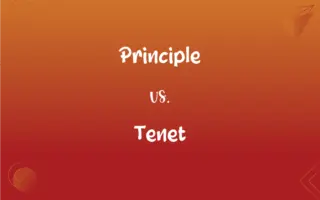Stay vs. Keep: What's the Difference?
Edited by Janet White || By Harlon Moss || Updated on November 6, 2023
"Stay" means to remain in a particular place or condition; "keep" means to continue having, holding, or maintaining something.

Key Differences
Stay often implies a halt or pause, maintaining a position or condition, while keep implies an ongoing action, a continuity of possession, or maintenance. When you stay somewhere, you do not move from a location or change your state. When you keep something, you retain possession of it or continue an action or condition.
The command to stay is frequently used to mean not to move or to remain stationary, while to keep can mean to maintain a condition or persist in an action. Telling someone to stay put is asking them not to move from a spot, whereas telling someone to keep calm is asking them to maintain a state of calmness.
Stay can also refer to a period of residing somewhere temporarily, as in a stay at a hotel, which is a noun form. Keep, however, when used as a noun, refers to the strongest or central tower of a castle, indicating something that is retained or held securely.
In relationships, telling someone to stay can be a plea for them not to leave, physically or emotionally. Telling someone to keep in touch, however, is asking for continuity of communication, to maintain the connection over time. Stay focuses on the present state, while keep looks toward an ongoing future condition.
When used with objects, stay may imply that the object remains in its place or condition, as in "The vase will stay on the shelf." In contrast, keep used with objects means to retain possession or maintain the condition of the object, as in "Keep the receipt for your records."
ADVERTISEMENT
Comparison Chart
Primary Meaning
To remain in a place or condition.
To retain or continue to have something.
Verb Type
Often intransitive (does not require a direct object).
Can be transitive (requires a direct object) or intransitive.
Usage in Commands
Implies stopping or not moving.
Implies continuing an action or maintaining possession.
Temporality
Associated with a temporary state or action.
Suggests an ongoing action or a longer duration.
Noun Form
A period of residing temporarily (e.g., a hotel stay).
The main tower of a castle; control or care of something.
ADVERTISEMENT
Stay and Keep Definitions
Stay
To continue in a fixed or established position.
The memory will stay with her forever.
Keep
To maintain possession of something.
Please keep your ticket until the end of your journey.
Stay
To remain in a place rather than leave.
They decided to stay at the beach for another hour.
Keep
To continue or persist in an action or state.
She keeps trying despite the challenges.
Stay
To continue to be in a particular state or position.
Please stay seated until the performance has ended.
Keep
To preserve something in its original state or in good condition.
Keep the leftovers in the refrigerator.
Stay
To pause or halt at a specific point or action.
The conversation came to a stay when the phone rang.
Keep
To adhere to an obligation, promise, or condition.
Keep your word and show up on time.
Stay
To reside temporarily.
We will stay in a cabin for our vacation.
Keep
To hold or retain in one's possession or control.
He keeps a collection of rare books in his study.
Stay
To continue to be in a place or condition
Stay home.
Stay calm.
Keep
To retain possession of
Kept the change.
Must keep your composure.
Stay
To remain or sojourn as a guest or lodger
Stayed at a motel.
Keep
To have as a supply
Keep spare parts in case of emergency.
FAQs
What is an example of "stay" in a command?
"Stay here" means do not leave this place.
Is "keep" only used as a verb?
No, "keep" can also be a noun, meaning the main tower of a castle or control of something.
How is "keep" used in a command?
"Keep quiet" means continue to be quiet.
Does "keep" suggest a long-term action?
"Keep" can imply both short-term and long-term actions or states.
What does "stay" imply in common usage?
"Stay" commonly means to remain in a place or condition.
What does "keep" typically mean?
"Keep" often means to retain possession or continue a condition.
Can "keep" refer to mental states?
Yes, such as "keep calm."
What is the difference between "stay tuned" and "keep in touch"?
"Stay tuned" means wait for further information, while "keep in touch" means continue to communicate.
Can "keep" be related to a job?
Yes, in phrases like "keep watch."
Can "stay" be used as a noun?
Yes, "stay" can refer to a period of temporary residence.
Does "stay" have a formal usage?
Yes, it can be used formally in contexts like "stay your hand."
Can "keep" be used in a protective sense?
Yes, like "keep safe."
Can "stay" indicate a temporary situation?
Yes, "stay" often implies a temporary state.
Can "keep" be used in terms of agreements?
Yes, like in "keep a promise," it means to fulfill an agreement.
Is "stay" always physical?
No, "stay" can also be metaphorical, as in "stay true."
Does "stay" relate to temporary lodging?
Yes, as in "hotel stay."
Is "stay" used in technology terms?
Yes, like in "stay connected."
Can "keep" imply secrecy?
Yes, as in "keep a secret."
Can "stay" be used in legal terms?
Yes, such as "stay of proceedings."
Is "keep" used in financial contexts?
Yes, like "keep accounts."
About Author
Written by
Harlon MossHarlon is a seasoned quality moderator and accomplished content writer for Difference Wiki. An alumnus of the prestigious University of California, he earned his degree in Computer Science. Leveraging his academic background, Harlon brings a meticulous and informed perspective to his work, ensuring content accuracy and excellence.
Edited by
Janet WhiteJanet White has been an esteemed writer and blogger for Difference Wiki. Holding a Master's degree in Science and Medical Journalism from the prestigious Boston University, she has consistently demonstrated her expertise and passion for her field. When she's not immersed in her work, Janet relishes her time exercising, delving into a good book, and cherishing moments with friends and family.































































